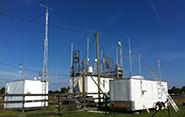$12 Million NSF Grant Will Establish Nationwide Atmospheric Measurement Network

A team of researchers from multiple institutions, with Georgia Tech serving as the lead, have been awarded a $12 million grant from the NSF Mid-Scale Research Infrastructure program to provide high time-resolution (every 1 to 15 minutes), long-term measurements of the properties of atmospheric particulates known as aerosols, which have significant effects on health and climate change.
The award will establish a network of 12 sites around the United States, including locations in national parks and some of the country's largest cities. Each will be outfitted with state-of-the-art instruments for characterizing the properties of aerosols. These sites will form what is officially called the Atmospheric Science and mEasurement NeTwork (ASCENT).
Data from ASCENT will allow researchers to address a variety of questions about how the composition and abundance of aerosols are changing, such as how the modernization of electrical production (coal to natural gas to renewable) and transportation (gasoline to electric vehicles) affect air pollution and climate-relevant variables.
ASCENT will also advance understanding of the adverse health impacts of PM2.5 (particulate matter with a diameter smaller than 2.5 micrometers). Exposure to PM2.5 has been associated with cardiopulmonary diseases and millions of deaths per year.
Partnered on the grant is Drew Gentner, associate professor of chemical & environmental engineering and the environment. He and his research group will be installing a powerful suite of instruments in New York City, one of the 12 chosen sites and the only site in the mid-Atlantic or Northeast. The location was chosen to complement the others with a focus on urban air quality in NYC and the impact of the nearby marine environment on atmospheric chemistry in the urban area.
"We are excited to bring long-term measurements of the chemical composition, size distribution, and trace metal content of aerosols to the metro New York City region using advanced instrumentation that has not been deployed like this before," Gentner said. "New York City and the Long Island Sound remains an important area for atmospheric research, and it is great that the region gets to participate in this new U.S. network."

